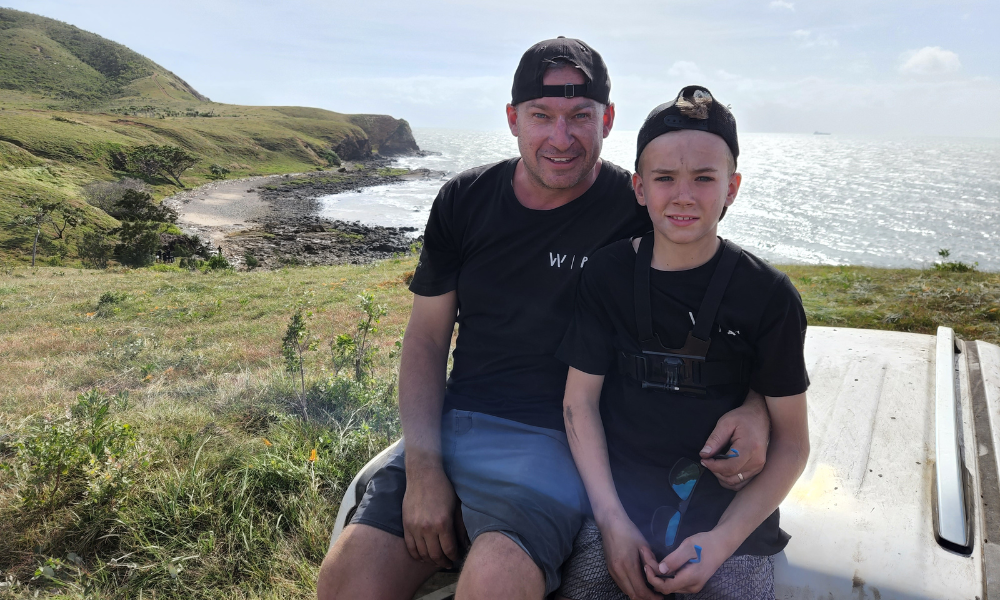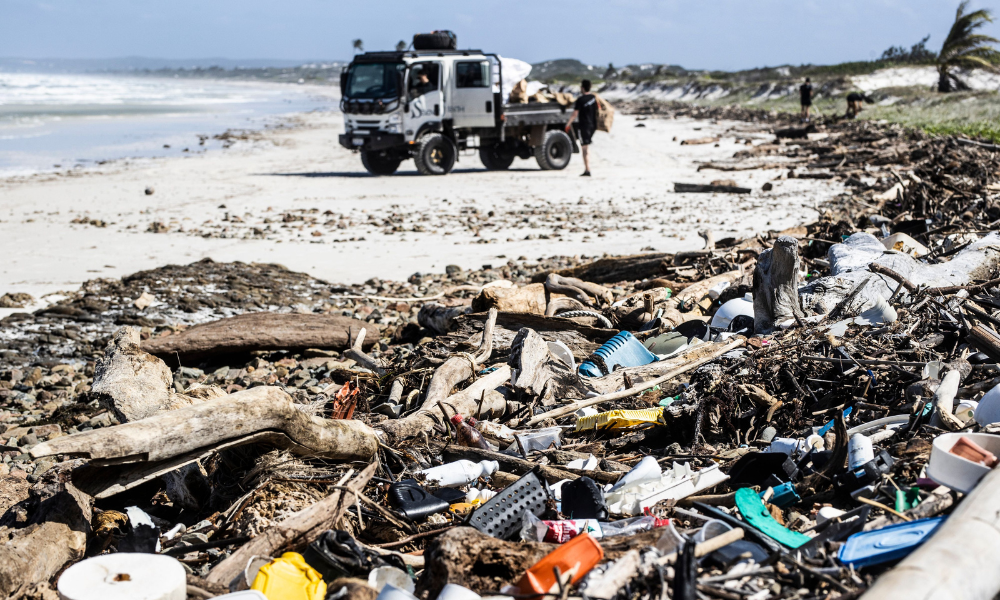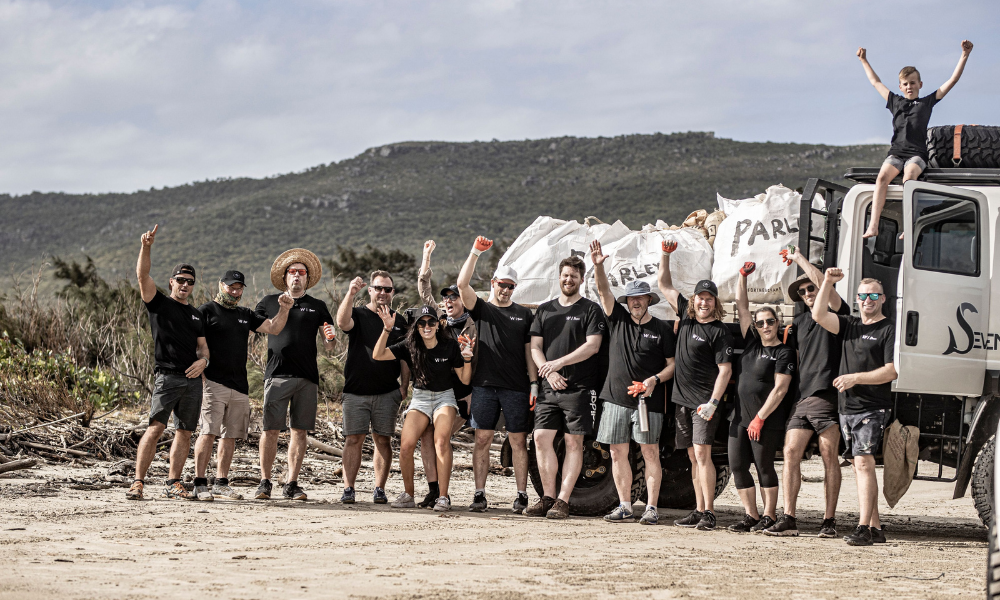Group impels mammoth coastline clean-up

Specialist Finance Group (SFG) and WLTH recently joined forces, collecting tonnes of rubbish from the northernmost part of the country, including Cape Bedford headland and beach, and Cape Flattery.
WLTH joined SFG’s lender panel, available to its network of over 1,000 brokers in May. For every settled loan with WLTH, 50 square metres of beach and coastline is cleaned up by their team alongside their partners, Parley for the Oceans, a global non-profit focusing on protecting the oceans.
Read more: WLTH clinches deal with SFG
SFG general manager Blake Buchanan (pictured above with son) was invited to witness and contribute firsthand towards a current national emergency: the proliferation of plastic waste littering Australia’s oceans and coastline.
Speaking to MPA, Buchanan said it had always been his wish to visit some of the most remote parts of Australia, particularly Cape York Peninsula in Far North Queensland.
“I think I represent many when picturing the most remote parts of Australia and what we expect to see, being pristine, untouched, rugged yet glorious coastlines with nature in abundance,” Buchanan said.
On June 17, Buchanan and his son Jack flew to Cairns to commence their journey to Far North Queensland, checking into the WLTH x Parley centre for an induction. Joined by 15 others, they were driven by 4WD for around six hours, arriving at Cape Bedford, the Aboriginal Shire of Hope Vale (around an hour and a half north of Cooktown). Setting up their tents in the dark, this was to be their ‘home’ for the next four nights.
Waking at sunrise, the team downed a quick, healthy breakfast before discussing the day’s agenda and safety requirements. Buchanan said he was initially “somewhat sceptical” about commentary referring to the coastline as a stretch of beach that resembled a tip from end-to-end.
Following a 40-minute drive through rugged terrain, the team arrived and took a lap around the beach, at which point Buchanan said his scepticism was abated.
“Along the tide mark, with a width of around 10 metres and as far as the eye could see, was rubbish everywhere mostly made up of plastics, fishing nets, shoes, and what seemed like millions of bottles,” Buchanan said.

“Without time to waste, we began to collect and weigh the plastic waste and fishing nets that we collected. In what seemed like only an hour, we had already collectively filled the back of a truck with waste weighing in at about a tonne. I must note that this huge amount of waste was collected over a distance of no more than 100 metres on a beach that spans kilometres.”

Later that day, aboriginal elders described what it was like when they were growing up in the region, with pristine waters and an abundance of wildlife. Buchanan said one of their standout comments was that the birdlife would crowd and nest at the beach when they were kids, noting that sadly, this was no longer the place they grew up in.
“What we saw each day would have been no more than a dozen birds and mostly in flight. This is due to what they believe to be significantly reduced numbers as they consume the indigestible plastics by mistake, making them feel full - and eventually result in them starving to death. If this is the effect on birds, what is it doing to the marine life?” Buchanan said.
As the team travelled to a new region and cleaned the coast each day, Buchanan said it was a paradox to sit in some of the most amazing and untouched countryside in Australia, with no people in sight, surrounded by rubbish and waste.
“The waste is captured in the currents of the Coral Sea which picks up rubbish from fishing vessels and many other countries before circling the north-eastern coastline and dumping it on our shorelines north of Port Douglas and all the way up to Cape York,” Buchanan said.
It was scary to think about the potential adverse effects of microplastics within humans, and the impact on the next generation, Buchanan said.
“The irony here is that WLTH will be using intercepted and upcycled Parley Ocean Plastic to make the Convego Parley Ocean Card associated with their home loan products to serve as a constant reminder in customers’ wallets about their contribution to the environment and a symbol of change to make informed environmental choices when shopping.”
Buchanan said he was aware that significant changes require a significant time investment, which, due to busy schedules and family commitments, see people choose convenience over lifestyle overhauls. By being more aware of the issue and making small or large choices, Australians could assist with the health of the planet – and benefit future generations.
“This might mean choosing products that use biodegradable containers over plastics, recycled plastic over virgin plastics or, if you like a product that uses plastics, to shoot an email off to the company telling them that you love their product and encourage them to choose more environmental packaging. Enough groundswell will always result in awareness and eventually change for the right reasons,“ Buchanan said.
Referring to the clean up as “life changing” and a “real eye opener”, Buchanan said in business, people strive to be better tomorrow than what they are today.
“Usually this has us focus on our systems, people, service, growth and overall offer. In addition to these efforts, by partnering with WLTH, our business can be better each day by contributing to such an important issue, and yours can too,” he said.
Each loan settled under the WLTH partnership helps with contribution of funds to Parley for the oceans and supports quarterly trips made by staff and clients to assist with ocean clean-ups.



